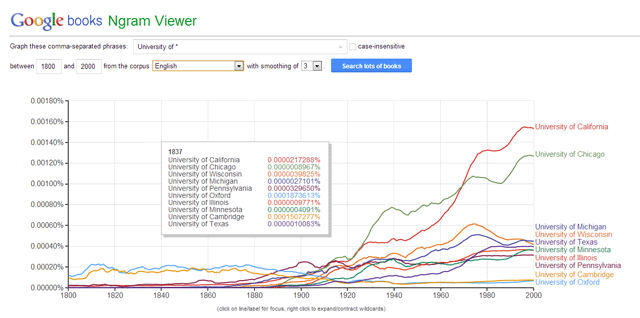The Google Books Ngram Viewer finds use in the hands of word lovers and those interested in linguistics. Maintaining its tradition of continuous tinkering, Google made two major improvements to the analytical tool for a more powerful linguistic search. The Ngram Viewer gets wildcard search and the ability to search for inflections, aided by multiple capitalization styles.
Anyone who has seriously searched the web knows the power of wildcards. Wildcards now allows anyone to dig deeper into phrase usage by placing a ‘*’ next to the word. For instance, to find the most popular words following "University of", search for "University of *".
Similarly, you can do an inflection search by adding a _INF to word n-grams and thus observing the usage of all the modifications a phrase has gone through. For instance, searching "book_INF a hotel" will display results for "book", "booked", "books", and "booking". This allows someone to see how the variations of word usage have occurred across time.
The Google Books Ngram Viewer has also enabled case-insensitive search in the update. With this, you can easily cover capitalization and non-capitalization uses of certain words.
The Ngram Viewer was launched three years back to give users a way to plot the frequency of words over a historical period using the huge amount of digitized data available with Google Books. The Ngram Viewer allows anyone to catch word trends and see their usage over time on a graph. This simple utility has proved to be a powerful visual tool in the hands of language analysts and even lay users. But are you aware of The Google Books Ngram Viewer? If yes, do these changes spell a more effective use?
Source: Google Books Ngram Viewer via TechCrunch


